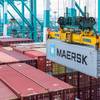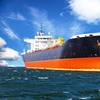Mexican Yard Services US-sanctioned Tankers that Carry Venezuelan Oil
Three Cuban-flagged tankers that are under U.S. sanctions for transporting Venezuelan oil to the Communist-run island have been serviced in the port of Veracruz on Mexico's Gulf coast, according to vessel tracking data and industry sources.
The maintenance work on the vessels—one of which was serviced as recently as this month—is a potential breach of sanctions on Venezuela, two lawyers who specialize in U.S. sanctions said.
However, the United States has in the past not brought enforcement actions against shipyards for doing work on blacklisted vessels from those countries, according to U.S. Treasury Department data.
Under U.S. law, companies and individuals are prohibited from materially assisting sanctioned entities. The ships were targeted in 2019 as part of sanctions on the oil trade between the two allies, which are both at odds with Washington.
The Treasury Department, which directs U.S. economic sanctions, declined to comment. The U.S. State Department did not reply to a comment request.
Authorities in Veracruz are unlikely to have checked if the tankers were sanctioned, according to one source at the port, so may have inadvertently authorized blacklisted vessels.
The shipyard would just have checked whether a ship was insured and classified, while the port authority would only have authorized a vessel to enter the port, the source said.
One Cuban tanker, named Petion, recently underwent work at the Hutchison Ports TNG shipyard in Veracruz, according to two sources. The ship docked in Veracruz on March 1, according to Refinitiv Eikon shipping data, and was preparing to sail as of April 29, according to two sources at the port.
Hutchison Ports TNG, which is owned by Hong Kong-based conglomerate CK Hutchison Holdings Ltd, declined to comment.
Mexico's Navy, which oversees port authorities, and Veracruz's port authority did not respond to requests for comment.
Satellite pictures seen by Reuters showed Petion near Hutchison Ports TNG's shipyard in Veracruz in early April. One of the sources said the vessel was repaired at the firm's dry dock.
The Petion is the third sanctioned Cuban tanker to be serviced in Veracruz since the measures were imposed in September 2019, according to shipping data. The other vessels are the Esperanza and Maria Cristina, according to the data.
Reuters could not identify which shipyard in Veracruz received the other two tankers, which arrived in January 2020 and October 2020. Several maritime firms offer similar services in Veracruz.
Venezuela's oil ministry and the marine authority did not respond to requests for comment.
The foreign ministries of both Mexico and Cuba did not reply to requests for comment.
The three tankers were placed on the U.S. Treasury Department's list of sanctioned entities in 2019, when the Office of Foreign Assets Control (OFAC) imposed measures against the vessels, their owners, operators and charterers for transporting oil from Venezuela to Cuba.
Cuba has around 10 flagged tankers that navigate international waters. The three sanctioned tankers make about a voyage a month from Venezuela to Cuba.
That would mean they transport about 47,000 barrels per day (bpd) of crude and fuel, the equivalent to just over 40% of Cuba's total oil imports, according to export documents from Venezuelan state oil company PDVSA and Refinitiv Eikon data.
The U.S. sanctions targeted Venezuela's oil sector and the mechanisms used to transport oil to Cuba, which according to Washington provided a lifeline to Venezuelan President Nicolas Maduro. Many Western nations do not recognize Maduro's presidency.
OFAC said then that Cuba's state-run oil import and export company Cubametales, and maritime entities were circumventing sanctions by facilitating oil shipments from Venezuela.
The U.S. executive order under which the Cuban vessels were targeted is "sufficiently broad to allow the United States to sanction the shipyard," said Matthew Oresman, who leads law firm Pillsbury's international public policy practice.
But that does not mean the shipyard would necessarily be sanctioned, Oresman said. Sanctions "are imposed at the discretion of OFAC and the U.S. government more broadly," he added.
"It is highly unlikely that the U.S. government will sanction a shipyard in Mexico without any previous warning to the company or the government," said Jonathan Epstein, partner at law firm Holland & Knight.
He said the executive order used for imposing the sanctions did not have a requirement that entities needed to intend to break sanctions for them to be in violation of U.S. law.
Epstein said the U.S. government would sometimes give companies or people "verbal clearance" to do business with sanctioned entities without themselves incurring any punishment.
The Treasury Department, the State Department and Hutchison did not reply to emails asking if verbal clearance had been given for the Cuban ships in Veracruz, or if a warning was issued to the shipyard.
Sanctioned ships have few options outside their home countries to get the work done that keeps them seaworthy. Merchant vessels require detailed inspections at least every 30 months in order to have class certificates renewed to remain seaworthy.
Cuban tankers transporting Venezuelan crude and fuel, most of them operated by sanctioned company Caroil Transport Marine LTD, have faced problems in renewing their insurance and documentation proving seaworthiness since Panama stripped the vessels of its flag due to sanctions, the sources said.
Reuters could not reach Caroil, which is incorporated in Cyprus, for comment.
Mexico's left-leaning President Andres Manuel Lopez Obrador has improved relations with Cuba since taking office two-and-a-half years ago.
(Reporting by Marianna Parraga, additional reporting by Yahir Ceballos, Lizbeth Diaz, Frank Jack Daniel, Luc Cohen, Sarah Marsh, Daphne Psaledakis and Jonathan Saul; Editing by Daniel Flynn and Alistair Bell)












